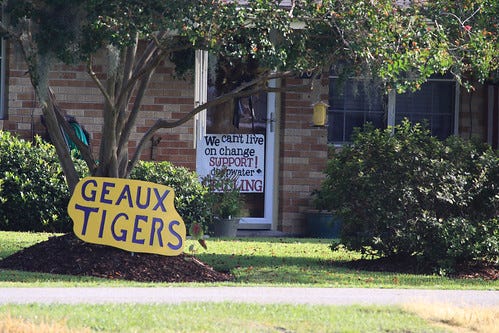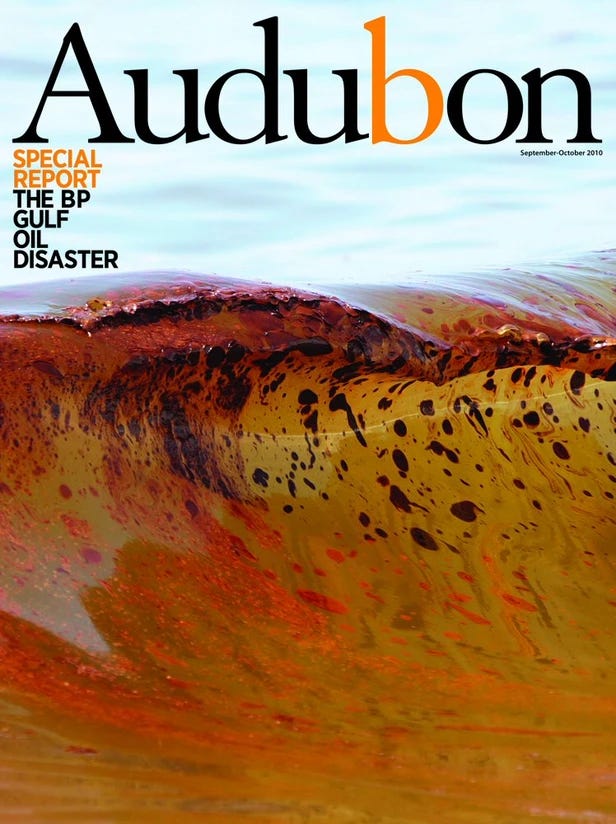(Listen to the radio version here.)
After I left Louisiana during my trip to the Gulf after the BP oil spill, I headed to Alabama. I had dinner one night at a Waffle House with a friend of mine and her husband. BP was contracting with him to take field scientists out in his boats to collect samples along some transects in the Gulf. Each jar was carefully labeled with the date, time, and GPS coordinates where that sample was collected. One day, most of their samples looked pretty clean, but one was an oily mess. When they got to the lab that day and a BP lab scientist saw that bottle, he demanded to know where they got it. The field scientist and my friend showed him the GPS coordinates, and the BP guy said that was “Impossible. There’s no oil there!” and threw out the sample.
My friend’s husband’s eyes welled with tears when he told me this. He said, as if I had any doubt, that he may not have finished high school but he really did know how to use his boat’s GPS. I think it was easier for him to wrap his head around the idea that professional scientists could doubt his GPS skills than that BP would intentionally throw out a sample—one collected to find out exactly where the oil was—because they didn’t want anyone to know exactly where the oil was.
A great many people who live along the Gulf depend, directly or indirectly, on the oil industry for their livelihoods. We saw plenty of protest signs in yards, but also plenty of signs of support for BP. Many locals trust that the oil companies really do their best to safely extract this essential resource that virtually everyone in America depends on.
The Deepwater Horizon explosion was an accident, and a complicated one. The drilling rig itself was built by the South Korean company Hyundai Heavy Industries, owned by Transocean, and much of its contract work done by Halliburton. The unprecedented magnitude of the oil gushing from the ruptured bottom was horrifying for everyone, but local people could see firsthand how hard BP and the other corporations were working to cap the rupture. Corexit, the very toxic dispersant being used, was indeed dispersing some of the oil—breaking it into tinier droplets that they believed would be more efficiently gobbled up by microbes. And some of the oil really was evaporating into the air, which is the reason I felt so woozy when I was visiting Grand Isle State Park.
It wasn’t just BP telling people the oil was disappearing before doing much damage. If anyone doubted their word, one of the most recognized and respected conservation organizations in America, Audubon, was saying this, too. Indeed, the cover story of the September-October 2010 issue of Audubon, “Special Report: The BP Gulf Oil Disaster,” written by Ted Williams, an Audubon columnist with a reputation for zealous outspokenness, compared this spill to the devastating (but much smaller) Exxon oil spill:
Deepwater Horizon oil is different. It is highly volatile, and nearly half evaporates immediately. In the intense heat, bacteria consume other fractions. Also, the leak is almost 50 miles at sea, giving dispersion and natural breakdown processes more time to kick in.
(I would provide a link to this Audubon article, but it has since been removed from Audubon’s website. The issue cover and some articles from this issue are linked in their archives here, but the cover story is not.)
With such assurances by the government, BP, and Audubon itself, of course virtually all the major news media accepted and reported that the crisis was pretty much over. The only national news reporter who seemed reluctant to accept BP’s word without confirmation was Anderson Cooper. I know he interviewed Drew Wheelan, and twice during and after my trip to the Gulf, his fact-checkers contacted me with questions.
Almost 15 years after the spill, what could and should have been done better? And what can we do as individuals and as members of organizations, institutions, and government agencies to stand up to the corporations and billionaires who are taking so much control over our lives? I’ll wrestle with that question next time.







I don't know who we CAN believe, but I know who we CANNOT believe...
Makes me so sick...I know when the next spill happens, I'll do my best to do as you have done!